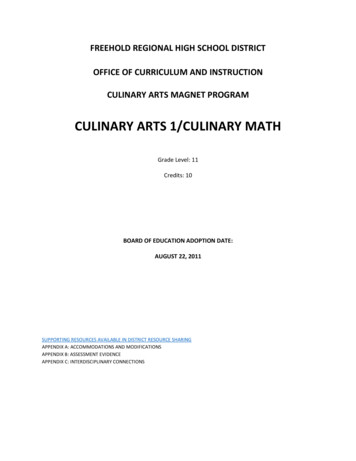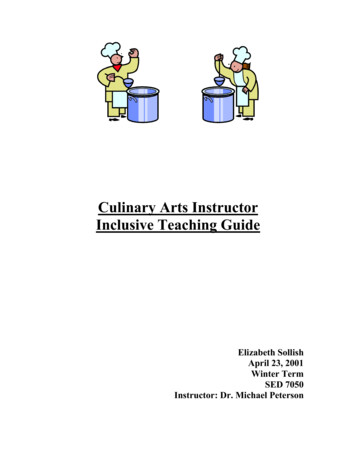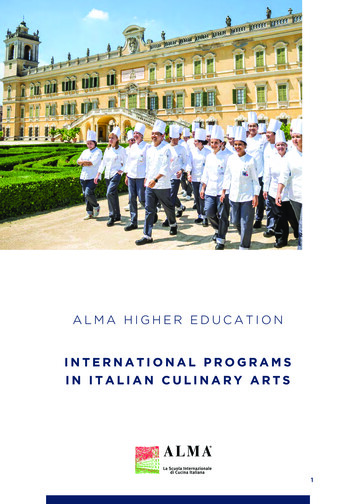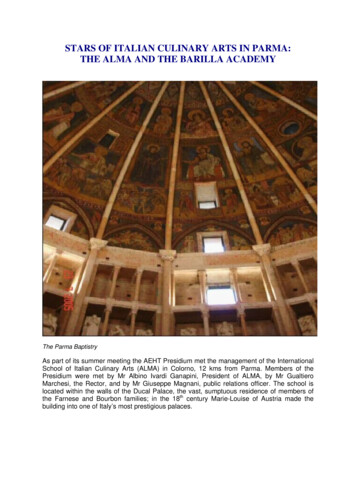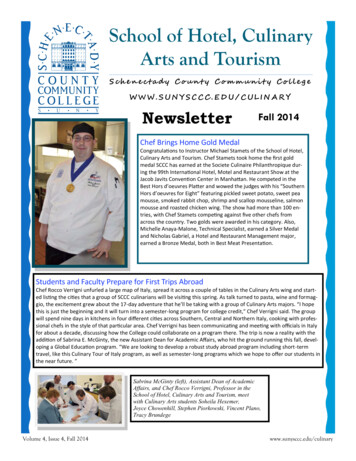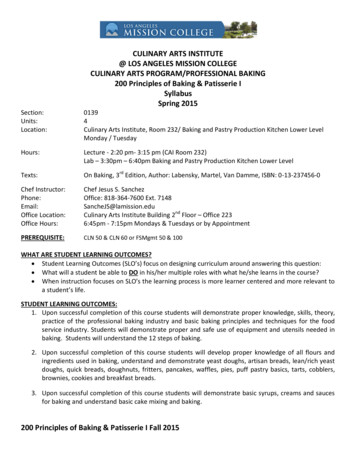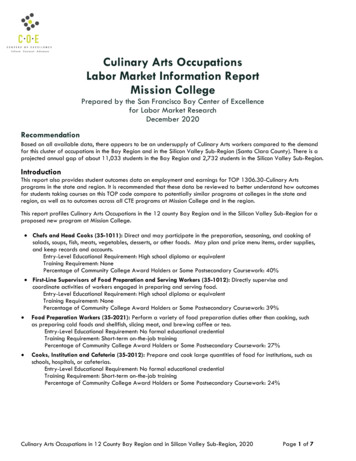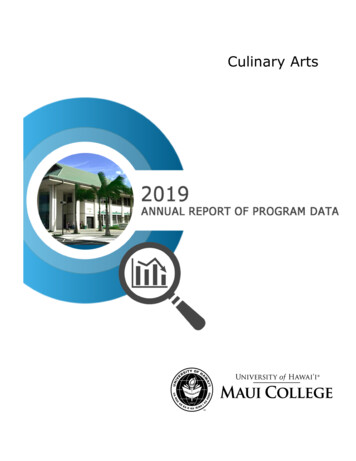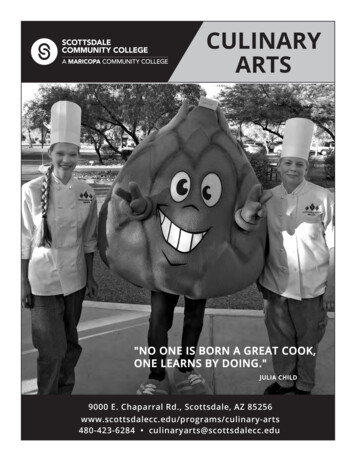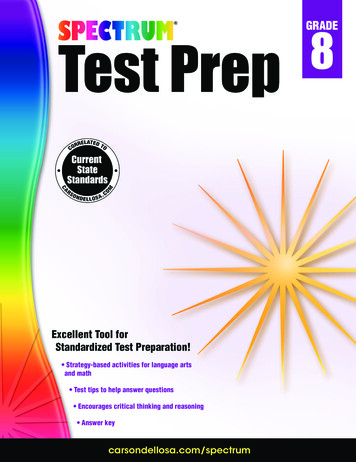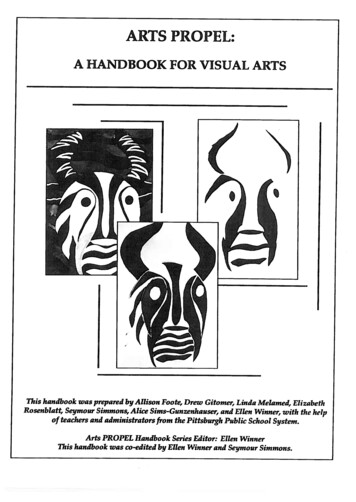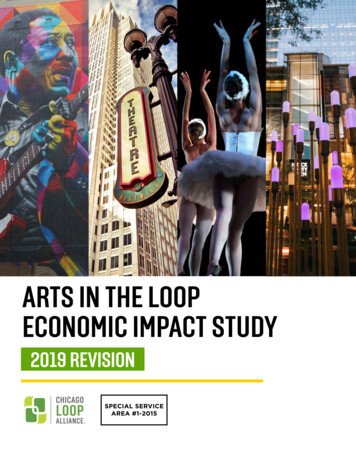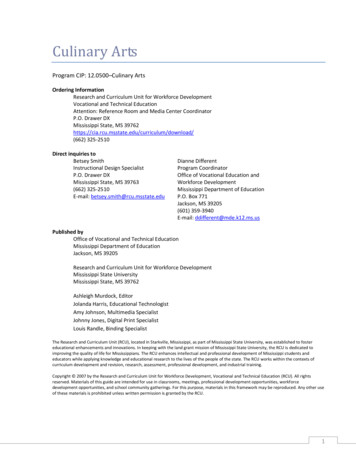
Transcription
Culinary ArtsProgram CIP: 12.0500–Culinary ArtsOrdering InformationResearch and Curriculum Unit for Workforce DevelopmentVocational and Technical EducationAttention: Reference Room and Media Center CoordinatorP.O. Drawer DXMississippi State, MS ad/(662) 325-2510Direct inquiries toBetsey SmithInstructional Design SpecialistP.O. Drawer DXMississippi State, MS 39763(662) 325-2510E-mail: betsey.smith@rcu.msstate.eduDianne DifferentProgram CoordinatorOffice of Vocational Education andWorkforce DevelopmentMississippi Department of EducationP.O. Box 771Jackson, MS 39205(601) 359-3940E-mail: ddifferent@mde.k12.ms.usPublished byOffice of Vocational and Technical EducationMississippi Department of EducationJackson, MS 39205Research and Curriculum Unit for Workforce DevelopmentMississippi State UniversityMississippi State, MS 39762Ashleigh Murdock, EditorJolanda Harris, Educational TechnologistAmy Johnson, Multimedia SpecialistJohnny Jones, Digital Print SpecialistLouis Randle, Binding SpecialistThe Research and Curriculum Unit (RCU), located in Starkville, Mississippi, as part of Mississippi State University, was established to fostereducational enhancements and innovations. In keeping with the land grant mission of Mississippi State University, the RCU is dedicated toimproving the quality of life for Mississippians. The RCU enhances intellectual and professional development of Mississippi students andeducators while applying knowledge and educational research to the lives of the people of the state. The RCU works within the contexts ofcurriculum development and revision, research, assessment, professional development, and industrial training.Copyright 2007 by the Research and Curriculum Unit for Workforce Development, Vocational and Technical Education (RCU). All rightsreserved. Materials of this guide are intended for use in classrooms, meetings, professional development opportunities, workforcedevelopment opportunities, and school community gatherings. For this purpose, materials in this framework may be reproduced. Any other useof these materials is prohibited unless written permission is granted by the RCU.1
Table of ContentsAcknowledgments . 3Preface . 5Executive Summary . 6Research Synopsis . 12Professional Organizations . 15Culinary Arts . 19Unit 1: Introduction . 19Unit 2: Human Relations Management . 41Unit 3: Food Safety and Sanitation . 58Unit 4: Foodservice Equipment, Safety, and Security. 79Unit 5: Culinary Foundations . 99Unit 6: Breakfast Foods, Dairy, and Sandwiches . 122Unit 7: Fruits, Vegetables, Salads, and Garnishes . 135Unit 8: Culinary Math . 155Unit 9: Orientation . 176Unit 10: Hospitality Industry . 193Unit 11: Potatoes and Grains . 216Unit 12: Customer Communication and Service . 231Unit 13: Desserts and Baked Goods. 251Unit 14: Culinary Business Concepts . 263Unit 15: Meat, Poultry, and Seafood . 284Unit 16: Stocks, Sauces, and Soups . 297Student Competency Profile for Culinary Arts . 308Recommended Tools and Equipment . 311Appendix A: 21st Century Skills Standards . 315Appendix B: Mississippi Academic Standards . 316Appendix C: ACT College Readiness Standards . 322Appendix D: National Industry Standards . 335Appendix E: National Educational Technology Standards for Students . 3382
AcknowledgmentsThe Culinary Arts Curriculum Framework and Supporting Materials was presented by the MississippiBoard of Education on May 16, 2008. The following persons were serving on the State Board at the time:Dr. Hank M. Bounds, Executive SecretaryMr. Claude Hartley, ChairMr. William Harold Jones, Vice ChairMr. Howell “Hal” N. GageDr. O. Wayne GannMs. Rebecca HarrisMr. Charles McClellandMs. Sondra Parker CaillavetMs. Rosetta RichardsDr. David SistrunkSpecial thanks is extended to the members of the Culinary Arts Curriculum Framework and SupportingMaterials Professional Advisory Team. Members of this team include the following:Derrick Scales, Cracker BarrelChef David Stutts, Magnolia Regional Hospital, Corinth, MSStevie Wortham, Sodexho Foodservice Food Production ManagerChef Frank Lauterman, Manager H.S. Relations Orlando Culinary AcademyW. Don Sally, CFBE, FMP, Director of Food and Beverage, Hollywood Casino TunicaPatricia Allen, Cafeteria SupervisorLarry Williams, Delta Citizens AllianceMike Cashion, Executive Director, Mississippi Restaurant AssociationDr. James Fitzgerald, Mississippi University for Women Culinary Arts InstituteMatthew Bedwell, McAlister’s Deli, Starkville, MSSarah Labensky, Red Dog Enterprises, LLCJay Yates, The Veranda/Foodworks MGMT LLCDonnie Mitchell, Broma’s Deli, Brookhaven, MSTroy Smith, Long’s Fish Camp, Enterprise, MSAlso, special thanks to the teachers who contributed teaching and assessment materials that areincluded in the framework and supporting materials. Members who contributed include the following:Linda Durand, Greenville Technical Center, Greenville, MSShirlaurence Fair, Carl Keen Vocational Center, Clarksdale, MSTim Gilmore, Northeast Mississippi Community College, Booneville, MSRobert Rhymes, Coahoma Community College, Clarksdale, MSAppreciation is also expressed to the following staff members at the Mississippi Department ofEducation for providing guidance and insight throughout the development process:Dianne Different, Program Coordinator, Office of Vocational Education and WorkforceDevelopment, Mississippi Department of EducationChris Wall, Director of Instructional Programs and Student Organizations, Office of VocationalEducation and Workforce Development, Mississippi Department of Education3
Gratitude is expressed to the members of the Technology Advisory Committee. This committee playedan instrumental role in the development of the Culinary Arts Curriculum Framework and SupportingMaterials Laboratory Specifications. Members of this committee include the following:Dr. Doug Belk, Technology Coordinator, Pascagoula School DistrictMr. Mike Mulvihill, Interim Associate Superintendent, Office of Vocational Education andWorkforce DevelopmentMs. Christy Todd, Education Specialist, Office of Vocational Education and WorkforceDevelopmentFinally, standards in the Culinary Arts Curriculum Framework and Supporting Materials are based on thefollowing:Academic StandardsMississippi Department of Education Subject Area Testing ProgramACT College Readiness StandardsThe College Readiness Standards are sets of statements intended to helpstudents understand what is expected of them in preparation for theACT. These standards are integrated into teaching and assessmentstrategies throughout the curriculum framework.21st Century Skills and Information and Communication Technologies LiteracyStandardsIn defining 21st century learning, the Partnership for 21st Century Skills has embraced fivecontent and skill areas that represent the essential knowledge for the 21st century: Globalawareness; civic engagement; financial, economic, and business literacy; learning skills thatencompass problem solving, critical thinking, and self-directional skills; and Information andCommunication Technology (ICT) Literacy. Reprinted with permission.National Educational Technology Standards for StudentsReprinted with permission from National Educational Technology Standards for Students:Connecting Curriculum and Technology, copyright 2007, ISTE (International Society forTechnology in Education), 1-800-336-5191 (U.S. and Canada) or 1-541-302-3777(International), iste@iste.org, www.iste.org. All rights reserved. Permission does notconstitute an endorsement by ISTE.National Restaurant Association Educational FoundationReprinted with permission from the National Restaurant Association (NRA). NRA, 2001–2008 National Restaurant Association Educational Foundation 175 West Jackson Boulevard,Suite 1500, Chicago, IL 60604-2814 1-800-765-2122, or Chicago land 312-715-1010ServSafe StandardsReprinted with permission from the National Restaurant Association (NRA). NRA, 2001–2008 National Restaurant Association Educational Foundation 175 West Jackson Boulevard,Suite 1500, Chicago, IL 60604-2814 1-800-765-2122, or Chicago land 312-715-10104
PrefaceSecondary vocational–technical education programs in Mississippi are faced with many challengesresulting from sweeping educational reforms at the national and state levels. Schools and teachers areincreasingly being held accountable for providing true learning activities to every student in theclassroom. This accountability is measured through increased requirements for mastery and attainmentof competency as documented through both formative and summative assessments.The courses in this document reflect the statutory requirements as found in Section 37-3-49, MississippiCode of 1972, as amended (Section 37-3-46). In addition, this curriculum reflects guidelines imposed byfederal and state mandates (Laws, 1988, ch. 487, §14; Laws, 1991, ch. 423, §1; Laws, 1992, ch. 519, §4eff. from and after July 1, 1992; Carl D. Perkins Vocational Education Act IV, 2007; and No Child LeftBehind Act of 2001).5
Executive SummaryProgram DescriptionCulinary Arts is a pathway for students in the Human Science, Art, and Humanities career cluster. Thefollowing description is from the current Standard Course of Study, for Career–Technical Education,Mississippi Department of Education.The Culinary Arts pathway program includes classroom and hands-on experiences that will preparestudents for employment or continuing education in the foodservice industry. This program was writtento incorporate the National Restaurant Associations (NRA) ProStart learning objectives. Any studentwho successfully completes this program and the mentoring requirements of the NRA can take theNational ProStart Certificate of Achievement exam. This is a national certification program recognizedthroughout the foodservice industry. Each district should implement a maximum student number due tothe size of each lab.Industry CertificationThis program was designed to articulate to postsecondary Food Production, Hotel and RestaurantManagement, and Culinary Arts. Industry standards are based on the National Restaurant AssociationProStart Certification and the National Restaurant Association ServSafe Certification.AssessmentStudents will be assessed using the Culinary Arts MS-CPAS2 test. The MS-CPAS2 blueprint can be foundat p. If there are questions regarding assessment ofthis program, please contact the Culinary Arts instructional design specialists at the Research andCurriculum Unit at 662.325.2510.Student PrerequisitesIn order for students to be able to experience success in the Culinary Arts program, the followingstudent prerequisites are in place:1. C or higher in English (the previous year)2. C or higher in Math (last course taken or the instructor can specify the math)or3. Instructor Approval and TABE Reading Score (eighth grade or higher)or4. Instructor Approval6
Proposed Applied Academic CreditThe mathematics content in the Culinary Arts program is meaningful and useful to students who areentering the foodservice industry. Applied mathematics content was aligned to the 2007 MississippiMathematics Framework Revised Academic Benchmarks.Licensure RequirementsMississippi teacher license endorsement 972 is needed to teach the Culinary Arts pathway.Requirements for the 972 educator endorsement are listed below:1. Applicant must have earned an AA degree or higher.2. Applicant must enroll immediately in the Vocational Instructor Preparation (VIP) or the RedesignEducation Program (REP).3. Applicant must complete the individualized Professional Development Plan (PDP) requirementsof the VIP or REP prior to the expiration date of the 3-year vocational license.4. Applicant must complete all components of the national Prostart Certification program.5. Applicant must successfully complete the ServSafe certification exam (updated every 5 years).6. Applicant must successfully complete an approved computer literacy certification exam.7. Applicant must successfully complete a certification for an online learning workshop, module, orcourse that is approved by the Mississippi Department of Education.8. Applicant must successfully complete a Culinary Arts certification workshop, module, or coursethat is approved by the Mississippi Department of Education.Professional LearningIf you have specific questions about the content of each training session provided, please contact theResearch and Curriculum Unit at 662.325.2510, and ask for the Professional Learning Specialist.Course OutlinesThis curriculum provides options for local school districts to meet student needs and schedulingdemands. The first option groups units into four 1-Carnegie unit courses. The second option groups unitsinto two 2-Carnegie courses. Please see below for a description of each option.Option 1This option consists of four 1-credit courses that should be completed in the following sequence:1. Orientation to Culinary Arts (Course Code: 996002)2. Theory and Applications of Culinary Arts I (Course Code: 996004)3. Theory and Applications of Culinary Arts II (Course Code: 96005)4. Advanced Studies in Culinary Arts (Course Code: 996006)Course Description: Orientation to Culinary Arts includes the foundation skills necessary in thefoodservice industry. Content such as food safety and sanitation, equipment, safety and security,culinary foundations and math, and an introduction to the hospitality industry are included in thecourse. Mastery of the competencies listed in the food safety and sanitation unit will prepare the7
student to take the NRA’s ServSafe exam to become ServSafe Food Safety certified. As of January 1,1999, every foodservice establishment in Mississippi must have a full-time certified food manageremployed in order to meet the FDA Food Code requirements. Students are encouraged to take thisexam.Course Description: Theory and Applications of Culinary Arts I emphasizes real-world, hands-on practiceof food preparation. Food preparation techniques included in this course include breakfast foods, dairy,and sandwiches; fruits, vegetables, salads, and garnishes; and potatoes and grains. This one-Carnegieunit course should only be taken after students successfully pass Orientation to Culinary Arts (CourseCode: 995002).Course Description: Theory and Applications of Culinary Arts II emphasizes real-world, hands-on practiceof food preparation. Food preparation techniques included in this course include desserts and bakedgoods; meat, poultry, and seafood; and stocks, sauces, and soups. This one-Carnegie unit course shouldonly be taken after students successfully pass Theory and Applications of Culinary Arts (Course Code:995004).Course Description: Advanced Studies in Culinary Arts is a culminating course that places emphasis onan internship experience. While they participate in the on-the-job training, the students will use theirskills that are related to management and business concepts, customer communication, and customerservice. Before students can complete the Advanced Placement Culinary Arts course, they must meetthe following requirements:Score 80% or higher on the MS-CPAS2 summative assessment.Attendance rate of 92% or better in the Orientation to Culinary Arts (Course Code: 996002) andthe Theory and Applications of Culinary Arts parts A and B (Course Code: 996004 and 996005)Find a job related to the culinary industry.Orientation to Culinary Arts (One Carnegie Unit) - Course Code: 996002UnitTitle1Introduction2Human Relations Management3Food Safety and Sanitation4Foodservice Equipment, Safety, and Security5Culinary FoundationsHours10253030351308
Theory and Applications of Culinary Arts I (One Carnegie Unit) - Course Code: 996004UnitTitle6Breakfast Foods, Dairy, and Sandwiches7Fruits, Vegetables, Salads, and Garnishes8Culinary MathHours25352585Theory and Applications of Culinary Arts II (One Carnegie Unit) - Course Code: 996005UnitTitle9Orientation10Hospitality Industry11Potatoes and Grains12Customer Communication and Service13Desserts and Baked GoodsHours2030252525125Advanced Studies in Culinary Arts (One Carnegie Unit) - Course Code: 996006UnitTitle14Culinary Business Concepts15Meat, Poultry, and Seafood16Stocks, Sauces, and SoupsHours45252595Option 2This option consists of two 2-Carnegie unit courses that should be completed in the following sequence.1. Culinary Arts I (Course Code: 996000)2. Culinary Arts II (Course Code: 996001)Course Description: Culinary Arts I is the first course of the program. Food preparation techniquesincluded in this course are breakfast foods, dairy, sandwiches, salads, garnishes, fruits, and vegetables.Management skills emphasized are basic customer service, food safety and sanitation, workplace safetyand security, culinary basics, equipment, nutrition, human resources, math, and food cost control.Mastery of the competencies listed in the food safety and sanitation unit will prepare students to takethe N
Culinary Arts is a pathway for students in the Human Science, Art, and Humanities career cluster. The following description is from the current Standard Course of Study, for Career–Technical Education, Mississippi Department of Education. The Culinary Arts pathway program includes classroom and hands-on experiences that will prepareFile Size: 2MB
